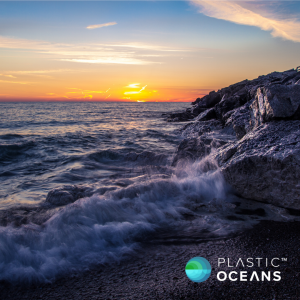This year’s World Oceans Day (or World Oceans Week) feels different for a multitude of reasons. Most of which I need not explain. So that prompted me to do something a little different as well. What bodies of water don’t get a day or a week commemorated in their honor? Lakes and rivers. DID YOU KNOW freshwater lakes are now heavily affected by microplastic pollution? Did you also know that most major rivers flow into the ocean? These lesser honored bodies of water deserve as much attention for many reasons.

The power and beauty of Lake Huron, one of the five Great Lakes.
Lakes serve as a vital resource for many areas around the world. They’re a water source for many communities, they act as a source of ecotourism, they contribute to the biodiversity of that given ecosystem, and they even help preserve the natural balance of the ecosystem by acting as flood control. These bodies of water are becoming increasingly saturated with plastic and microplastic pollution. One study found microplastic abundances to be as high as 4,200 microplastic particles per kilogram of sediment, within a lake. These small plastics are known to attract surrounding chemicals or pollutants at dangerously high concentrations. They are also able to enter the food chain at a lower level and concentrate as they move up the food chain to reach the highest predators, even human beings.
Rivers have been documented containing over 2,400 microplastic particles per kilogram of river sediment. They are now considered as highways, delivering inland microplastics directly to the ocean. The Ebro River, for example, was found to contain 3+ particles per cubic meter of river water. The destination for these microplastics? The beautiful and crucially important Mediterranean Sea. Another river in China was found to have a staggering 300 to 7,900 microplastics per cubic meter of river water and in Paris, a river was documented carrying 3-100 microplastic per cubic meter of river water. These rivers flow into the ocean. In some cases, such as the Ebro River, 70% of the microplastics found were in the form of fibers, most likely coming from the washing of synthetic clothing.
Rivers and lakes are essential to the health of our surrounding environments and contribute to healthy oceans as well. Yet in comparison to oceans, rivers and lakes are massively understudied, requiring much more attention when it comes to plastic pollution. Happy World Oceans Day/Week to one and all, just remember that plastic pollution is not picky when it comes to water sources. We must better understand how to reduce our output of plastic waste and focus on each ecosystem it impacts as much of the time, they all connect and lead back to us.
Sources:
-Geological Society of America. “Microplastics in the Great Lakes: Becoming benthic.” ScienceDaily. ScienceDaily, 23 September 2019.
-Fischer, Elke Kerstin, et al. “Microplastic pollution in lakes and lake shoreline sediments–a case study on Lake Bolsena and Lake Chiusi (central Italy).” Environmental Pollution 213 (2016): 648-657.
-Barbuzano, J. (2019), Rivers are a highway for microplastics into the ocean , Eos, 100, https://doi.org/10.1029/2019EO130375. Published on 09 August 2019.
PLEASE CONSIDER DONATING TO SUPPORT OUR EFFORTS TO END PLASTIC POLLUTION

Trackback: sex 2024